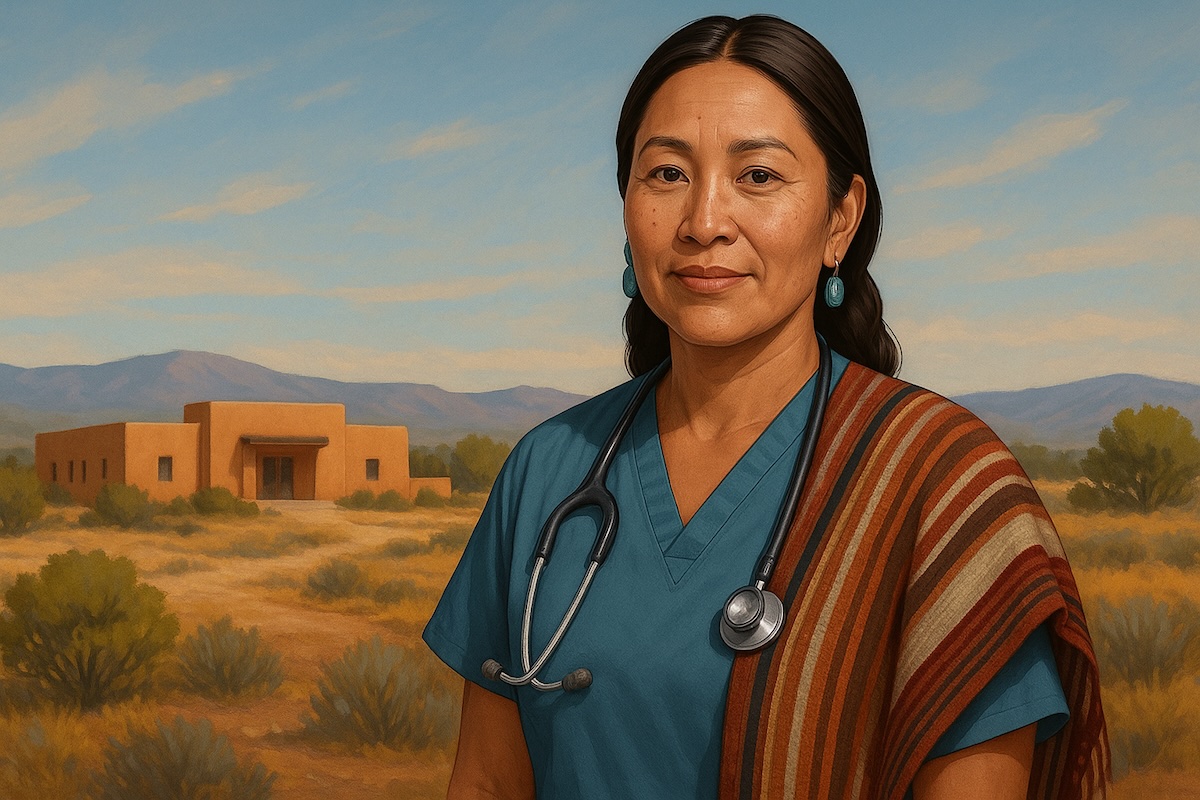Nicolle Gonzales, a Diné (Navajo) Certified Nurse Midwife in New Mexico, is working to restore Indigenous birthing practices and reclaim cultural agency for Native American families. As one of fewer than two dozen Native CNMs in the U.S., she founded the Changing Woman Initiative to build the first Indigenous-led birth center in the country.
Fighting Maternal Mortality with Cultural Safety
Native American women are over twice as likely to die from pregnancy-related causes as white women in the U.S. Gonzales believes that cultural disconnection is part of the problem. “Our bodies carry ancestral trauma,” she says, “and reclaiming our birth practices is healing.”
Through the Changing Woman Initiative (CWI), Gonzales addresses care inequities and creates community-driven models that merge Western midwifery with Navajo traditions.
“At the birth center, you won’t have to ask anybody for permission.”
— Nicolle Gonzales, CNM
How Gonzales Became a CNM
Gonzales began her nursing journey as a registered nurse before pursuing her Master of Science in Nursing, focusing on midwifery. After becoming a Certified Nurse Midwife (CNM), she practiced in hospitals across the Southwest, where she witnessed firsthand how disconnected many Native families felt from institutional birthing systems. Her experience as a Diné woman fueled her mission to create culturally affirming care spaces for Indigenous communities.
What the Birth Center Will Offer
Currently in development, the center will support cultural autonomy during pregnancy and birth by offering:
- Access to sacred practices (sage, drumming, Navajo ceremonies)
- Community-centered births with no visitor limits
- Full-scope midwifery and prenatal care
- Holistic support: nutrition, counseling, and postpartum healing
What Makes Indigenous Midwifery Unique
Indigenous midwifery is rooted in tradition, storytelling, and ceremony. Unlike Western models that focus primarily on medical management, Indigenous approaches recognize birth as a sacred rite of passage. Midwives like Gonzales honor pregnancy’s physical, spiritual, and communal dimensions, often involving elders, family, and land-based practices in the birthing process.
This philosophy fosters trust, supports maternal mental health, reduces stress, and honors centuries of generational wisdom.
Existing Services: From Vision to Reality
While fundraising for the permanent facility continues, CWI already provides clinical and cultural care through:
- Corn Mother Clinic: A pilot wellness space in New Mexico for prenatal care and community education
- White Shell Woman Services: Homebirth midwifery program honoring Diné and Indigenous traditions
- Traditional Care Support: Elders, medicine bundles, and ceremony integration
Leadership Beyond the Birth Center
Gonzales now leads the Improving Perinatal Health ECHO project at the University of New Mexico. The initiative trains rural and tribal health providers to support respectful, safe, and inclusive maternity care.
She also speaks nationally about Indigenous maternal health, reproductive justice, and how systemic racism impacts Native families.
Barriers Facing Indigenous Students in Midwifery
Despite the critical need for culturally competent care, Native American students face systemic barriers in becoming Certified Nurse Midwives. Financial hurdles are common: many tribal communities lack access to scholarships, internet service, and pre-nursing prerequisites. The nearest midwifery school might be hundreds of miles away in rural areas.
Once admitted, Indigenous students often face cultural isolation and a lack of mentorship in predominantly white academic programs. Without faculty who understand Native traditions or the historical trauma of medical racism, students may struggle to feel seen or supported. These barriers contribute to the fact that less than 1% of CNMs in the U.S. identify as Native American.
Organizations like the Changing Woman Initiative and academic partners like the Perinatal Health ECHO are working to change that by creating pathways, mentorship, and clinical experiences grounded in Indigenous knowledge.
How You Can Support or Learn More
Whether you’re a nurse, midwifery student, or advocate for birth justice, there are meaningful ways to support Nicolle Gonzales’ mission:
- Visit and donate to the Changing Woman Initiative
- Share this story on social media to raise awareness
- Mentor or sponsor Indigenous nursing and CNM students
- Read about becoming a CNM in New Mexico if you’re inspired to pursue this path
Disclaimer
This article is for informational and educational purposes only. It does not substitute for professional medical advice. Always consult a licensed provider for clinical care.








